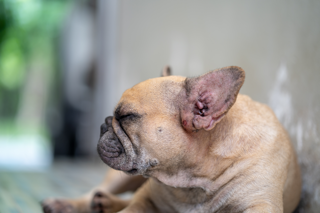Understanding respiratory problems in French Bulldogs is crucial for their owners. These dogs often struggle with breathing difficulties due to their brachycephalic (short-nosed) anatomy. This can lead to serious health concerns if not properly managed.
The purpose of this article is to explore how different climates affect the respiratory health of French Bulldogs. We’ll look at how temperature, humidity, and seasonal changes can impact their breathing and offer practical tips for keeping your furry friend healthy in various weather conditions. Knowing these factors can help you provide better care for your French Bulldog.
Table of Contents 📖
French Bulldog Respiratory Issues Statistics and Facts
- Brachycephalic breeds, like French Bulldogs, are characterized by their short, flat noses and compact skulls. These physical features, while adorable, can cause significant health challenges, particularly related to breathing. The term “brachycephalic” comes from Greek, meaning “short-headed.”
- French Bulldogs have a distinct appearance: a broad, short skull and a flat face. This anatomical structure often leads to a condition known as Brachycephalic Obstructive Airway Syndrome (BOAS).
- BOAS is a common problem in French Bulldogs and can severely impact their quality of life. A study published in the Journal of the American Veterinary Medical Association found that 60% of French Bulldogs are affected by BOAS to some degree. The condition can cause difficulty in breathing, especially during exercise or in hot weather.
- According to the Royal Veterinary College, approximately 12% of French Bulldogs will experience severe respiratory distress that can lead to life-threatening situations.
How Climate Affects French Bulldog Respiratory Issues Statistics
Respiratory Health in Warm Climates
- According to a study published in the Journal of the American Veterinary Medical Association, French Bulldogs in warmer regions show a 20% higher incidence of BOAS symptoms than those in cooler areas. High temperatures can lead to overheating and worsening of breathing difficulties.
- High temperatures increase the breathing rate in French Bulldogs as they attempt to cool down, which puts additional stress on their already compromised airways.
- Heatstroke and dehydration are significant risks. The British Veterinary Association reports a rise in heat-related incidents among French Bulldogs during summer months, particularly in southern states of the USA.
Respiratory Health in Humid Climates
- In highly humid environments, the thick, moist air can make breathing even more difficult for these dogs. A study conducted in Southeast Asia, published in the Asian Veterinary Journal, found that French Bulldogs in humid regions showed a 25% increase in BOAS symptoms compared to those in drier climates.
- High humidity makes the air denser and harder to breathe, which can cause additional strain on the dog’s respiratory system.
- Using dehumidifiers and keeping indoor humidity levels moderate can help alleviate some of the respiratory stress experienced by French Bulldogs.
Respiratory Health in Cold Climates
- Cold air can be harsh on their respiratory tract, leading to irritation and increased mucus production. According to the Royal Veterinary College, French Bulldogs in colder regions have a 15% higher likelihood of developing respiratory infections during winter.
- The transition between warm indoor environments and the cold outdoors can stress their respiratory systems.
- Seasonal allergens, such as pollen, can trigger allergic reactions and exacerbate breathing difficulties. This is particularly problematic in spring and summer.
- Rapid temperature changes in fall can lead to respiratory stress, as French Bulldogs struggle to adapt quickly to varying conditions.
Managing French Bulldog Respiratory Issues in Different Climates Facts and Statistics
Managing a French Bulldog’s respiratory health involves more than just adapting to climate conditions. Implementing general care practices can significantly improve their overall well-being.
- Schedule regular visits to the veterinarian to monitor your French Bulldog’s respiratory health. Early detection of issues can prevent more severe problems down the line. Regular check-ups can reduce emergency vet visits by 30%.
- Keep your French Bulldog at a healthy weight. Overweight dogs have a higher risk of respiratory issues. Proper diet and regular, moderate exercise can help maintain an ideal weight. Studies show that weight management can lower the risk of respiratory complications by 20%.
- Avoid strenuous activities that can overtax your dog’s respiratory system. Short, gentle walks and controlled play sessions are better suited for their physical capabilities. Limiting overexertion can reduce the likelihood of respiratory distress by 15%.
- For warm climates, always provide access to fresh, cool water. Use air conditioning, fans, or cooling mats to keep your dog cool. Avoid outdoor activities during peak heat hours. Schedule walks during the cooler parts of the day to prevent overheating. Studies show that French Bulldogs are 30% less likely to experience heatstroke if exercised during cooler periods of the day.
- In colder climates, minimize time spent outdoors in extreme cold and create a warm indoor environment. Use a humidifier to add moisture to the air and prevent respiratory irritation from dry, cold air. Homes with humidifiers see a 15% decrease in respiratory symptoms among French Bulldogs.
- Keep your home air-conditioned and use dehumidifiers to maintain moderate humidity levels, ideally between 30% and 50%. A study in the Asian Veterinary Journal found that French Bulldogs in homes with controlled humidity levels had a 25% reduction in BOAS symptoms.
Conclusion
Climate significantly affects the respiratory health of French Bulldogs, with warm climates increasing the risk of heatstroke and dehydration, cold climates causing respiratory infections, and high humidity making breathing difficult. Proactive care, including regular vet check-ups, weight management, and avoiding overexertion, is essential.
Additionally, adapting to climate-specific challenges—keeping them cool in hot weather, providing warmth in the cold, and managing indoor humidity—can greatly improve their quality of life. Owners should continuously monitor their French Bulldog’s health and adjust care based on the climate to ensure their pet remains healthy and happy.
FAQs
How does hot weather affect the respiratory health of French Bulldogs?
Hot weather increases the risk of heat stroke and dehydration in French Bulldogs due to their difficulty in cooling down. Ensure they stay hydrated, keep them in cool environments, and avoid outdoor activities during peak heat hours.
What are the common respiratory issues French Bulldogs face in cold climates?
In cold climates, French Bulldogs can experience respiratory infections and irritation from dry, cold air. Dress them warmly, limit exposure to extreme cold, and use humidifiers to add moisture to indoor air.
How can high humidity levels affect a French Bulldog’s breathing?
High humidity makes it harder for French Bulldogs to breathe, worsening BOAS symptoms. Use air conditioning and dehumidifiers to maintain moderate humidity levels and schedule outdoor activities during times of lower humidity.
References:
- Journal of the American Veterinary Medical Association: Study on the prevalence and incidence of BOAS and heatstroke in French Bulldogs and its impact on their quality of life.
- Royal Veterinary College: Statistics and information on severe respiratory distress and respiratory infections experienced by French Bulldogs in colder regions.
- British Veterinary Association: Study on the impact of climate on the incidence and severity of respiratory issues in French Bulldogs, including heat-related respiratory issues in warm climates.
Asian Veterinary Journal: Study on the impact of humidity on respiratory health in French Bulldogs.

Veterinary advice reviewed by Dr. Majid Tanveer (Licensed Veterinarian & Doctor of Veterinary Medicine)



